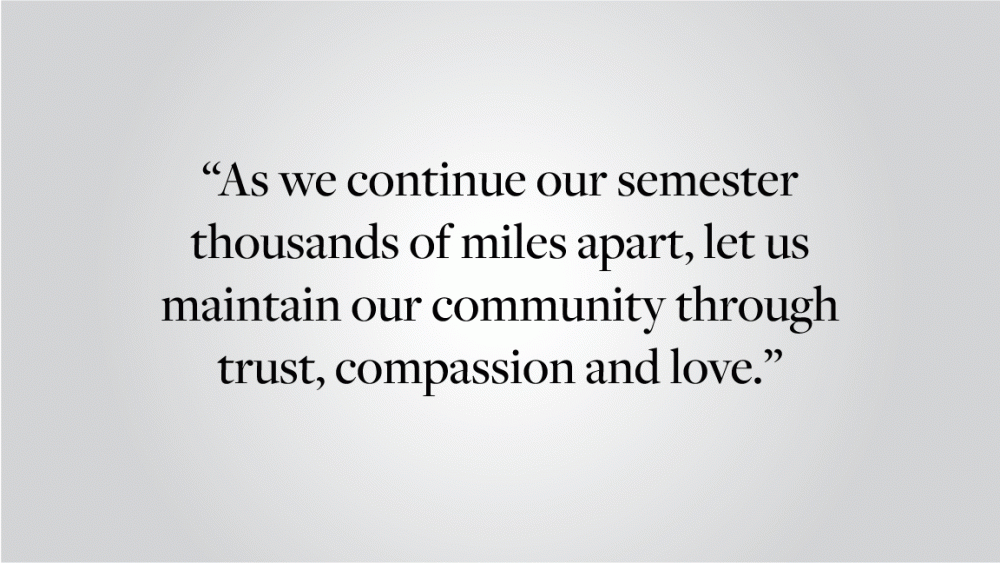It’s been repeated so many times that it’s become cliche: We are living through unprecedented times. After sending home the vast majority of students living on campus and urging those living off campus to leave, the University has tasked professors with moving their courses online. While the University has made temporary changes to academic policies and offered some guidance to professors, most decisions on how online courses will be run are left up to individual professors.
I know this transition must be stressful for professors as they make a major shift with very little time to prepare. But please remember that this transition is extremely stressful for students as well, especially students with limited access to technology, students in different time zones and students with challenging home lives. So when you decide how to teach the remaining material, how to assess students and how to address issues such as doctor’s and dean’s notes: Please, now more than ever, prioritize compassion over rigor.
Professors are juggling multiple challenges. First, many professors are figuring out how to cover the remaining material in their courses, especially after losing a week of class. It may be tempting to increase the amount of time students must spend in “class” — for example, by releasing videos that are longer than class time, or by expecting students to attend Zoom lectures in addition to watching recorded lectures. And while some students may have more time on their hands, many will not. Some students may be responsible for taking care of younger siblings who are no longer in school, or older relatives who have moved out of nursing homes. Even if students have more time, many may find it difficult to focus from home. Instead of increasing the time students must spend in “class,” consider covering less course material.
Second, professors are figuring out how to assess students in an online learning environment. The University has requested that professors give asynchronous “open book” final exams, or require a final project or paper instead. Typically, “open book” exams have more difficult questions than “closed book” tests, so professors may be tempted to increase the difficulty of their exams. Please don’t. Unless your original test required the regurgitation of information that could be easily googled, please keep your tests about the same, or have a “closed book” test based on the honor system. Sure, more students may receive high marks because they have access to their notes. But students are also facing new challenges when learning online from home. If more students receive A’s than you expected, that’s okay. After all, we are living through a pandemic.
Other professors may consider requiring students to complete a final project or paper instead of a sit-down final exam. But remember, when students chose to take your course, they were not expecting to complete this kind of project. I choose my classes to balance final exams and final papers; luckily, none of my professors has added a final paper or project, but if one did, it would upset the balance I’ve created and cause significant stress. If you do decide to require a final project or paper, please make it short and simple.
Finally, professors must think through how to address what happens if a student becomes sick or faces other challenges that would hinder their ability to complete assignments. Under normal circumstances, it is reasonable to require students to provide a doctor's or dean's note to receive an unexcused absence or submit an assignment late. During a pandemic, please consider simply trusting students. Without access to Health Services, students may not have easy access to a doctor. While it may be possible for some students to call a doctor and have that doctor email a note, our nation’s health providers have more important things to do right now. Additionally, while the University’s deans are available over the email and phone, the deans are likely very busy helping students deal with a variety of unexpected challenges; furthermore, the deans themselves have encouraged instructors to be flexible rather than require formal dean’s notes.
As I ask our professors to trust students, I also ask my fellow classmates to behave in a way befitting of that trust. I’d also like to thank the many professors who are already prioritizing flexibility and understanding.
As we continue our semester thousands of miles apart, let us maintain our community through trust, compassion and love.
Rebecca Aman ’20 can be reached at rebecca_aman@brown.edu. Please send responses to this opinion to letters@browndailyherald.com and op-eds to opinions@browndailyherald.com.

ADVERTISEMENT




